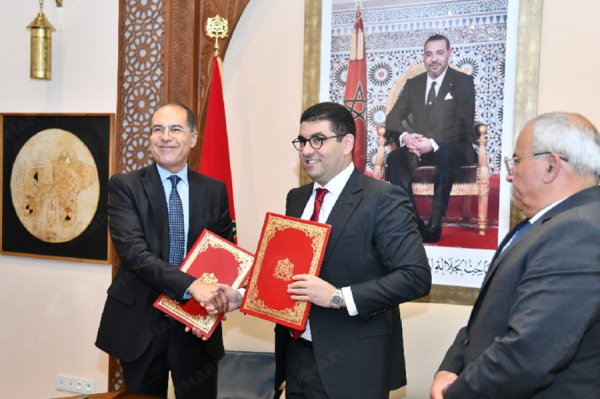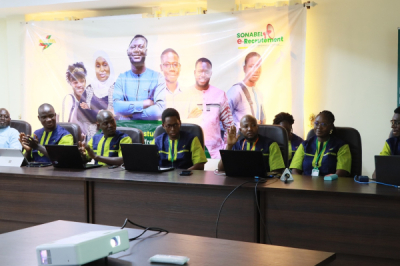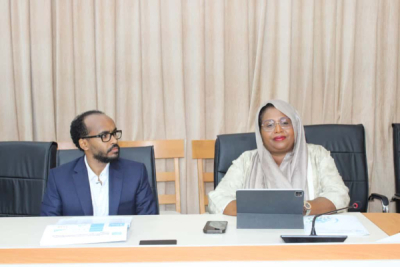
Tech (1152)
-
Plan includes national health data system, online services, and AI tools
-
Aims to ease system strain, but rural gaps and training remain key hurdles
Amid rising demographic pressure and growing strains on its healthcare system, Egypt is accelerating its digital transformation with a new national roadmap for the health sector. The country aims to leverage digital technologies to modernize management, expand access, and improve service efficiency.
Egypt officially unveiled its National Digital Health Strategy 2025-2029 on Saturday, November 15. Presented by Minister of Health and Population Khaled Abdel Ghaffar during the 3rd World Congress on Population, Health and Development (PHDC’25), the roadmap sets the foundation for a fully digitized health system by 2029.
A core element of the strategy is the creation of an integrated digital ecosystem intended to modernize health services through the systematic use of information technology. Key measures include consolidating national health data, building secure and interoperable digital platforms and expanding access to online services to improve the speed and reliability of patient monitoring.
The initiative falls under the broader “Digital Egypt 2030” transformation strategy, which places health among its priority areas. Implementation is supported by favorable conditions: the ICT sector is one of the fastest-growing in the Egyptian economy, and internet penetration exceeds 80%, according to DataReportal. Still, persistent disparities between urban and rural areas could slow the rollout of e-health solutions.
Several previous initiatives show that Egypt has already begun laying the groundwork for this transition. Millions of electronic medical records have been created under the universal health insurance program, while new platforms for telemedicine, hospital automation, and AI-assisted medical analysis continue to emerge.
For the government, the objective is twofold: to improve the efficiency of an overburdened healthcare system where bureaucratic bottlenecks and barriers to care remain widespread, and to strengthen national resilience against health crises, a priority underscored by the COVID-19 pandemic, which exposed the limits of traditional systems.
Implementing the strategy will require overcoming several challenges. Training health professionals to use new digital tools remains essential, as does strengthening cybersecurity to protect sensitive data. Expanding connectivity in underserved regions will also be critical to ensuring equitable access to digital health services.
Samira Njoya
-
Morocco launches Gamification Lab to support gaming start-ups and innovation
-
Initiative targets public-sector adoption in education, health, and tourism
-
Part of broader push to grow creative economy, now with 40 gaming start-ups
Morocco’s Ministry of Youth, Culture and Communication has partnered with the state-owned Caisse de dépôt et de gestion (CDG) and its investment arm, CDG Invest, to launch the “Gamification Lab” program. The agreement, signed in Rabat on Thursday, November 13, aims to boost local development and strengthen Morocco’s position in the fast-growing video game market.
The Gamification Lab will create a national platform to promote and facilitate the adoption of gamification solutions developed by Moroccan start-ups. These tools will be made available to public- and private-sector organizations active in education, health, culture, employment, and tourism.
Minister of Youth, Culture and Communication Mohamed Mehdi Bensaid said the initiative is part of a broader effort to support small cultural businesses, particularly those involved in video gaming. He noted the sector’s rapid expansion, pointing out that Morocco now counts around 40 gaming start-ups, compared with just two or three in 2021.
This new agreement follows recent efforts to organize and develop the gaming ecosystem. Last May, two agreements were signed to strengthen professional training in gaming-related careers. One introduced dedicated university programs in video game development, while the other created three vocational pathways: e-sport caster, e-sport streamer, and video game laboratory technician.
The announcement comes at a time when Africa’s gaming market is experiencing strong momentum. According to a report released in February by the African publisher Carry1st and research firm Newzoo, the sector generated 1.8 billion dollars in 2024, up 12.4 percent from 2023. By comparison, the global market grew by only 2.1 percent.
Through this partnership, Moroccan authorities aim to support content creation, strengthen the broader start-up ecosystem, and develop skilled employment. Their goal is to position Morocco as one of Africa’s emerging hubs in the creative and digital economy.
Samira Njoya
- Smart Africa signed multiple digital cooperation deals at TAS 2025 in Conakry
- Visa, Ascend, and others to support payments, data exchange, and youth programs
- Agreements aim to build digital skills, inclusion, and a Digital Single Market by 2030
Smart Africa signed a series of cooperation agreements on Thursday at the Transform Africa Summit (TAS) 2025 in Conakry. The deals include several memoranda of understanding and a contract with public and private partners aimed at advancing the continent’s digital transformation. The agreements focus on youth, digital skills, financial inclusion, data exchange, internet domain management and women’s leadership, with the longer-term goal of building African digital sovereignty and a Digital Single Market by 2030.
Digital payments and data exchange
Smart Africa signed an MoU with Visa to promote digital services and electronic payments as a driver of economic development. The agreement, signed by Smart Africa CEO Lacina Koné and Mina Abdo, Visa’s Head of Partnerships for Sub-Saharan Africa, covers the digitisation of public services, expansion of payment infrastructure, financial inclusion, support for e-commerce, and measures to facilitate trade and entrepreneurship across member countries. The parties say the aim is to strengthen Africa’s digital economy and support plans for a Digital Single Market by making electronic transactions easier within and between states.
Smart Africa also signed a contract with Ascend Digital Solutions to pilot the Smart Africa Data Exchange (SADX) platform. The system is intended to provide a secure, interoperable data exchange framework based on open standards. It is designed to support cross-border digital services, digital identity verification and data sharing between states. A pilot will be rolled out in Benin, Ghana and Rwanda under the Smart Africa Trust Alliance (SATA) initiative, as a first step toward wider deployment of cross-border digital services.
Youth, skills and internet governance
An MoU between Smart Africa and YouthConnekt Africa aims to support youth-led digital transformation. The two organisations plan to use existing Smart Africa Youth Chapters and YouthConnekt Country Chapters to connect young innovators, promote mentoring and entrepreneurship and highlight African digital solutions. They also intend to run joint programmes during major events, including TAS and the YouthConnekt Africa Summit, to give more visibility to youth initiatives.
To address digital skills gaps, Smart Africa signed an MoU with the government of Gambia on the deployment of the Smart Africa Digital Academy (SADA) in the country. The partnership will organise and coordinate digital training programmes for public decision-makers, young people, women and civil servants, in line with Gambia’s digital transformation priorities. The goal is to put in place long-term mechanisms for continuous training supported by national infrastructure.
Smart Africa also signed an MoU with the Africa Top Level Domains Organisation (AFTLD) to strengthen management of critical internet resources. The agreement covers capacity building on country-code top-level domain (ccTLD) management, work on policy alignment and measures to reinforce cybersecurity related to domain name systems. It also seeks to present a more unified African position in global internet governance forums.
In addition, an MoU with Women Political Leaders is intended to place gender considerations at the centre of digital policy. The partnership aims to promote a gender-sensitive digital transition, support women’s leadership in the digital sector, back women’s digital entrepreneurship and increase women’s influence in digital policy and governance.
Smart Africa says the deals signed at TAS 2025 are meant to deepen cooperation between governments, the private sector and international organisations around the alliance’s digital agenda. The next step will be turning the commitments into concrete projects in member states.
Muriel EDJO
- Guinea launched Simandou 2040’s third pillar to boost digital infrastructure
- Focus areas include public service digitalization, connectivity, and tech sovereignty
- Over 12,000 km of fiber deployed; AI, education, and data hosting prioritized
On the sidelines of the Transform Africa Summit (TAS) 2025 in Conakry, the Guinean government launched the third pillar of its Simandou 2040 program on Thursday, November 13. This new phase focuses on strengthening transportation, improving digital connectivity, and broadening access to essential services.
The pillar aims to position digital technologies as a key driver of national competitiveness. The objective extends beyond merely adopting digital tools to building a sovereign technological foundation: reinforced infrastructure, an updated regulatory framework, and redesigned public services intended to support growth, administrative efficiency, and inclusion.
The launch follows a period during which Guinea multiplied structural projects in the digital sector. The country established a Tier III Data Center for local hosting of public data, thereby strengthening its technological autonomy. Furthermore, the national.GN domain name was restored, signaling a commitment to consolidating the country's digital identity. These efforts include the progressive digitalization of the administration, with solutions such as FUGAS for public employee management and TELEMO, the public procurement platform launched on November 12 through collaboration with Rwanda.
In terms of infrastructure, Guinea has significantly expanded its connectivity capacity, deploying over 12,000 kilometers of fiber optic cable across the territory. The country is also investing in digital skills development through the creation of Digital Spaces, training programs, and school inclusion initiatives, including the GIGA project which has already connected more than 500 educational institutions. The design of a national technology park and a recent ecosystem assessment for artificial intelligence, conducted with the UNDP, are contributing to the elaboration of a national AI strategy.
The launch of Simandou 2040’s Third Pillar is expected to mark a new stage in structuring the overall project and developing a cohesive digital ecosystem. By combining infrastructure, modernizing public services, and strengthening skills, the initiative is positioned to reinforce Guinea's technological sovereignty, stimulate economic attractiveness, and prepare its youth for emerging digital careers.
Samira Njoya
-
SONABEL launched an online e-recruitment platform to modernize hiring and eliminate manual applications.
-
The tool centralizes the full hiring cycle and aims to boost transparency, efficiency and equal opportunity.
-
The platform raises cybersecurity concerns as public institutions face increasing digital attacks.
Burkina Faso has launched a broad plan to digitize public services. Public institutions continue to deploy digital platforms to simplify and secure administrative procedures.
The National Electricity Company of Burkina Faso (SONABEL) launched a new online e-recruitment platform on Tuesday, November 11, in Ouagadougou as part of its digital transition. The company designed the platform, named E-recrutement, to make hiring more transparent, faster and fairer by modernizing traditional methods and easing access to job offers at the state-owned utility.
The platform, available at recrutements.sonabel.bf, centralizes, automates and secures the entire recruitment cycle, from job posting to candidate selection. It replaces physical submissions and manual processing and offers each candidate a personal account and notifications throughout the application process.
Company officials said the system “saves considerable time, optimizes resource use and increases the visibility of job postings,” enabling SONABEL to attract more qualified profiles.
The initiative forms part of Burkina Faso’s wider digital public-service reform, as institutions seek to modernize operations, strengthen transparency and improve administrative performance. SONABEL had already introduced a platform for processing technical files and an e-counter for administrative procedures. The new recruitment tool expands the company’s portfolio of digital services.
The digital system aims to reinforce fairness and transparency in hiring by offering equal access to opportunities for all candidates. It also intends to streamline procedures by reducing processing times and centralizing data on a single interface.
However, the rollout raises cybersecurity challenges related to personal-data protection and authentication reliability. As cyberattacks against public institutions increase, authorities must secure data and deploy robust control mechanisms to safeguard the integrity of the recruitment process and maintain user trust.
This article was initially published in French by Samira Njoya
Adapted in English by Ange Jason Quenum
- The Startup Act aims to ease company creation and support youth employment
- The law includes a national fund of funds, a startup label, and fiscal incentives
- It is part of Vision Djibouti 2035 to build a stronger digital economy
Minister Delegate for the Digital Economy and Innovation Mariam Hamadou Ali (photo, right) presented the “Startup Act Djibouti” bill to the National Assembly on Sunday, November 9. The bill aims to make it easier to create technology companies and encourage youth employment. After extensive discussions, it received a favorable opinion and proposed amendments for review in a plenary session.
The “Startup Act Djibouti” includes several measures to support entrepreneurs and attract investors. It introduces the “Djibouti Startup” label to identify and promote young innovative companies, offering fiscal and financial incentives tailored to their needs.
The law also proposes a national fund of funds to strengthen venture capital and make financing more accessible to start-ups, along with a simplified customs window for technology companies. It also includes a “Startup Visa” to attract international talent and a unified digital platform, “Djibouti Startup,” which will serve as a support and monitoring portal for all start-ups in the country.
The bill aligns with Vision Djibouti 2035, which places innovation and digital transformation at the center of national strategy. It comes at a time when start-ups are growing rapidly but still face challenges in support and financing. It reflects the government’s plan to make Djibouti a regional entrepreneurship hub and unlock the creative potential of its youth.
Once adopted, the law will be followed by implementing decrees detailing practical measures, including label allocation, fund management, and visa eligibility requirements. For Minister Mariam Hamadou Ali, this law goes beyond a regulatory framework and represents a strong signal to young entrepreneurs and investors.
- The federal government deploys 1Gov ECM to digitize internal procedures
- The platform enables workflow automation, unified document management, and e-signatures
- The system supports Nigeria’s goal of a paperless government by the end of 2025
The federal government of Nigeria announced on Monday, November 10, the launch of the “1Gov Enterprise Content Management (ECM)” platform to modernize document management and digitize internal processes across the public service. The initiative, led by the Office of the Head of the Civil Service of the Federation and state-owned Galaxy Backbone Limited, aims to make the administration more efficient, transparent, and aligned with national digital sovereignty goals.
According to Didi Esther Walson-Jack (photo, left), Head of the Civil Service of the Federation, the rollout marks a decisive turning point for Nigeria’s public administration. She said the move toward a digital platform aligns with the Federal Civil Service Strategy and Implementation Plan (FCSSIP), which seeks to build a knowledge-based administration driven by data-focused decision-making.
The ECM system supports workflow automation, unified document management, and the adoption of electronic signatures. It replaces physical files with a secure digital environment hosted on the 1Gov Cloud, Nigeria’s sovereign infrastructure. According to official sources, more than 59,000 official email accounts have already been created.
For Galaxy Backbone Limited, the launch of the 1Gov ECM platform brings Nigeria closer to its goal of operating a fully paperless government by the end of 2025. The solution will centralize and secure government documents, automate workflows, and reduce reliance on physical records.
In a country with an online administration development index of 0.4815, ranked 144th out of 193 according to the United Nations, the system represents a major step toward modernizing public services, strengthening transparency, and improving access to digital public services for citizens.
- PortailBac centralizes registrations, online payments, and data for exams
- The platform supports automated processing and real-time, integrated management
- It aligns with Senegal’s New Deal Technologique for a fully digital education system
Senegal is advancing the digitization of its education administration with the launch on November 11 of PortailBac, a digital platform dedicated to the centralized management of the baccalaureate and the Concours général. The tool centralizes registrations, online payments, file tracking, and the production of official statistics.
“PortailBac is not only a technical tool, but a gateway that brings together the actors in the education system around a modernized and secure mission to streamline the procedures linked to the organization of the baccalaureate and the Concours général,” said Abdoul Aziz Diouf, director general of Higher Education at the Ministry of Higher Education, Research, and Innovation.
Developed by the Office du baccalauréat in partnership with the National Agency for Statistics and Demography (ANSD), PortailBac enables automated registrations, centralized data collection and processing, and a major reduction in human error. The tool, which is interoperable with other public systems such as Campusen, offers integrated, real-time management of applications. Officials say it will help produce reliable statistics essential for planning in the education sector.
This launch is part of the New Deal Technologique, Senegal’s national digital transformation strategy, and continues modernization efforts undertaken in recent years, including the abandonment of USB drives, the digitization of labels, and the electronic archiving of transcripts, introduced as early as 2006.
By strengthening the traceability of procedures and the reliability of data, PortailBac is expected to transform the management of national exams. Beyond administrative simplification, the platform paves the way for more effective education governance built on updated, actionable data. It also marks a key step toward an integrated digital education ecosystem, where institutions, teachers, and students interact through connected and secure tools.
-
Initiative aims to integrate Beninese languages into artificial intelligence
-
Citizens can record voice samples to train AI models on local languages
-
Project supports Benin’s national AI and big data strategy adopted in 2023
The Beninese government officially launched the “JaimeMaLangue” project on November 10 in Cotonou, an innovative initiative designed to integrate local languages into the artificial intelligence ecosystem. Led by the Agency for Information Systems and Digital Technology (ASIN) in partnership with the IIDiA Institute, the project combines culture and technology to promote linguistic inclusion.
Launched under the theme “Benin Speaks to the Future,” the initiative marks the beginning of a nationwide voice collection campaign. Citizens are invited to participate via the platform jaimemalangue.bj, where they can record sentences in their mother tongue. These recordings, validated by a committee of experts, will form a national database to train AI models capable of understanding and reproducing local languages. The pilot phase begins with Fongbé and will later expand to other languages such as Yoruba and Baatonu.
This national initiative is part of the National Artificial Intelligence and Big Data Strategy adopted in January 2023. Its goal is to leverage AI’s potential in sectors such as education, health, agriculture, and tourism, while positioning Benin as a key AI player in West Africa.
Beyond technological innovation, “JaimeMaLangue” reflects Benin’s ambition to be among the African pioneers in promoting an inclusive and culturally grounded digital environment. The project follows several recent initiatives, including the launch of the Beninese Languages Dictionary in July, illustrating the convergence between cultural identity and digital transformation.
By developing AI capable of understanding local languages, Benin aims not only to strengthen citizen participation but also to make digital services more accessible to all, regardless of the language spoken.
- Dakar Port, Customs launch digital BAD exchange system for Jan 2026 rollout
- Reform streamlines cargo clearance, links all port IT systems via GUPE
- Expected to cut delays, boost traceability, and secure cargo operations
The Autonomous Port of Dakar (PAD) and the Directorate General of Customs (DGD) have launched a pilot program for the electronic exchange of Goods Release Orders (BADs). The system is scheduled to go live on January 2, 2026, via the Electronic Port Single Window (GUPE).
The initiative seeks to improve transparency and efficiency in the logistics chain by streamlining cargo clearance operations.
The new system will connect the IT platforms of all port stakeholders to enable the automatic, near-instant processing of BADs. Previously, although partially digitized, the Goods Release Order, a key document authorizing cargo exit, still required manual validation and separate technical exchanges, causing delays and increasing the risk of errors.
This system interconnection completes the digitalization process undertaken by the Port of Dakar in recent years. The initiative builds on the PAD/DGD/DPW/GAINDE 2000 electronic data exchange protocol signed on June 3, 2025, which established interoperability between port and customs systems. It also forms part of Senegal’s broader effort to modernize its logistics chain through digital transformation, following the rollout of the Orbus Infinity platform in February 2024.
As a strategic player in foreign trade, PAD generates nearly 95% of national customs revenue, around 25% of the state budget, and plays a central role in Senegal’s economy. Through this interconnection, the port expects to achieve significant reductions in processing times, better traceability of operations, and enhanced security for cargo flows.
The electronic BAD exchange is also expected to reduce administrative burdens for operators and give them greater visibility over port activities.
Samira Njoya
More...
Seeking to become a major leader in African subsea infrastructure maintenance, Orange has ramped up its efforts. The multinational company confirmed that it has committed substantial new investments to meet this strategic goal.
French telecoms group Orange is expanding its subsea repair operations with the construction of two new cable-laying vessels that will maintain submarine infrastructure across Europe, the Middle East, and Africa, its subsidiary Orange Marine said on Monday.
Orange Marine and Elettra Tlc president Didier Dillard described the investment as strategic, saying the industry’s aging fleet has become a key concern.
“Building these new ships will enable Orange Marine and Elettra to have the most modern fleet in the world, serving all our clients globally, with an optimized environmental footprint,” Dillard said.
In Africa, the ships are expected to accelerate cable repairs and improve the reliability of coastal internet connections, which are often disrupted by storms, fishing activity, or outdated equipment. Almost all of the continent’s internet traffic runs through deep-sea fiber-optic cables that, when damaged, can slow or paralyze entire countries.
That vulnerability was exposed in March 2024, when multiple cables off Abidjan, including WACS, ACE, MainOne, and SAT-3, were damaged, causing widespread outages across West and Central Africa. Service restoration took several weeks for some systems.
Orange said the new ships, combined with a broader and better-distributed maintenance network, will cut repair times and limit revenue losses in its data business.
The vessels, modern versions of the Sophie Germain launched in 2023, have been ordered from Sri Lanka’s Colombo Dockyard and are scheduled to enter service in 2028 and 2029. They will be capable of maintaining existing systems and installing new cables at depths of up to 1,000 meters.
They will replace the Léon Thévenin, launched in 1983 and based in South Africa, and the Antonio Meucci, launched in 1987 and based in Italy. Those two ships currently handle cable maintenance in the Atlantic, Indian Ocean, Mediterranean, Black Sea, and Red Sea.
Each new vessel will feature hybrid diesel-battery propulsion, a streamlined hull that reduces fuel use by 25%, and Azipod thrusters for greater maneuverability. The design is expected to cut CO2 emissions by 20% compared with the current fleet. Shore-power connections will further reduce emissions while docked, and each ship will carry a remotely operated vehicle (ROV) designed by Orange Marine for rapid cable cutting, inspection, and burial.
Applied to African coasts, these improvements should reduce internet downtime affecting banks, governments, payment platforms, and e-health services.
Through Orange Marine and Elettra Tlc, the group currently operates two cable-laying vessels and one hydrographic survey ship.
“As a leader in global digital infrastructure, Orange manages over 450,000 km of undersea cables connecting all continents,” said Michaël Trabbia, CEO of Orange Wholesale. “This strategic investment in our fleet of cable ships will be a key to ensuring the resilience and security of the global Internet.” Orange’s message is clear: resilience is now a requirement, not a luxury.
Muriel EDJO
- Kenya and Denmark sign a cooperation deal on digital governance and public service modernization.
- The partnership will focus on digital infrastructure, interoperability, and capacity building.
- Denmark ranks first globally in e-government, while Kenya aims to expand digital access through its 2022–2032 master plan.
Kenya’s Cabinet Secretary for Information, Communications, and the Digital Economy, William Kabogo Gitau, and Denmark’s Ambassador to Kenya, Stephan Schønemann, signed a memorandum of understanding on November 6 in Nairobi to strengthen bilateral cooperation in the digital sector. The agreement covers public service modernization, knowledge exchange, and citizen-centered digital service development.
“This strategic collaboration will create joint opportunities in areas such as digital public infrastructure, interoperability frameworks, capacity building, policy dialogue, knowledge exchange, and expert forums between our two nations,” William Kabogo said on X.
Kenya has emerged in recent years as one of Africa’s most dynamic digital hubs. Through its Digital Master Plan 2022–2032, the country aims to deploy 1,450 community digital centers and digitize all public services. These initiatives have already improved its e-governance ranking. According to the United Nations’ 2024 E-Government Development Index, Kenya scored 0.6314 out of 1, ranking 109th out of 193 countries.
Denmark, meanwhile, leads the same index with a score of 0.9847, confirming its global leadership in digital governance. Its 2022–2026 national digital strategy focuses on cybersecurity, data interoperability, and improving state-citizen relations through unified, inclusive platforms.
This new agreement follows an initial memorandum of understanding signed in March, focused on cooperation in higher education, research, and innovation. It reflects the growing strategic partnership between Nairobi and Copenhagen around technology development and digital transformation.
The implementation of this new partnership is expected to benefit both countries, which are each pursuing global leadership in digital innovation. For Kenya, it should promote knowledge transfer, strengthen institutional capacity, and enhance public service performance. Denmark, for its part, gains an opportunity to showcase its expertise in digital governance and expand its technological cooperation with Africa through inclusive, sustainable partnerships.
-
Gozem launches Brazzaville operations, expanding across Francophone Africa
-
App offers green taxis, rentals, and digital tools for drivers
-
Entry follows Yango’s exit, targets mobility formalization and fintech growth
Pan-African super app Gozem officially launched its operations in Brazzaville on Wednesday, Nov. 5, marking a key step in its expansion strategy across Francophone Africa. Already operating in Togo, Benin, Gabon, and Cameroon, the application now seeks to address the mobility needs of the Congolese population with its digital model.
Brazzaville residents can now use the mobile application to book various types of transport, including geo-localized "green" taxis, high-end air-conditioned vehicles, and hourly rentals. Gozem emphasizes a social impact model: its partner drivers, designated "Champions," gain access to new revenue streams and digital tools, including geolocation, traceability, and digital payment options.
Capitalizing on Market Opportunity
The launch comes as the digitalization of mobility services in Congo-Brazzaville is still nascent, but meets a growing demand for efficiency, safety, and modernization. Gozem is well-resourced to fund its growth, strengthen its vehicle fleet, and activate new financial and logistics services, thanks to a $30 million Series B funding round, combining equity and debt, orchestrated by investors including SAS Shipping Agencies Services Sàrl (a subsidiary of the MSC Group) and Al Mada Ventures.
Gozem enters the market at an opportune time. The Yango application, which launched in Brazzaville several years ago, has ceased operations, leaving a void in the structured digital transport market in the Congolese capital. This lack of a major digital player offers Gozem a significant chance to establish itself as a leader, provided it successfully adapts its offerings to local specificities.
The company must navigate notable challenges, including the adoption of the new model by informal drivers, adherence to local regulations, user sensitization, and establishing reliable, high-quality service.
Gozem’s entry into Brazzaville could yield several positive results: improved quality and traceability of trips via geolocation and cashless payments, new economic opportunities for partner drivers, the gradual formalization of the informal mobility sector, and a catalytic effect on the local digital ecosystem.
Beyond mobility, this expansion reflects Gozem’s ambition to evolve into an "African Super App," progressively integrating delivery, mobile payment, and FinTech services, thereby contributing to the region's economic and digital dynamism.
Samira Njoya
-
UNDP, Orange Liberia sign MoU to boost youth digital skills
-
Program targets rural connectivity, training, and tech entrepreneurship
-
Orange pledges $200M to expand network, support digital growth
The United Nations Development Programme (UNDP) and Orange Liberia signed a Memorandum of Understanding (MoU) on Wednesday, Nov. 5, 2025, to promote digital inclusion and build digital skills among Liberia’s youth.
The collaboration combines the resources and expertise of both institutions to expand opportunities for digital training and tech entrepreneurship. The initiative will include training programs, mentorship, and startup support to build a more inclusive and sustainable digital ecosystem in Liberia.
Specific goals include fostering innovation, improving digital literacy, and expanding connectivity in rural areas.
Part of Liberia’s Digital Transformation Push
The partnership aligns with Liberia’s national digital transformation agenda, as the government seeks to leverage technology for economic growth and broader access. The private sector is also playing a key role in this effort.
Orange Liberia announced a $200 million investment plan this year to strengthen its network and improve service quality, particularly in underserved rural regions. The financial commitment underscores Orange’s efforts to expand connectivity and narrow the digital divide.
The agreement with UNDP builds on Orange’s previous initiatives in Liberia. In October 2020, the company opened the Orange Digital Center in Monrovia, a technology hub for youth training, innovation, and digital entrepreneurship. The new partnership extends that cooperation nationwide, with a focus on rural communities and local startups.
By focusing on youth and connectivity, the initiative aims to stimulate Liberia’s digital economy by creating jobs, supporting local businesses, and nurturing a generation of digital talent capable of leading the country’s technological transformation.
Samira Njoya















